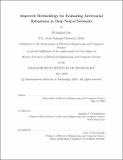Improved methodology for evaluating adversarial robustness in deep neural networks
Author(s)
Lee, Kyungmi,(Computer scientist)Massachusetts Institute of Technology.
Download1192484009-MIT.pdf (2.567Mb)
Other Contributors
Massachusetts Institute of Technology. Department of Electrical Engineering and Computer Science.
Advisor
Anantha P. Chandrakasan.
Terms of use
Metadata
Show full item recordAbstract
Deep neural networks are known to be vulnerable to adversarial perturbations, which are often imperceptible to humans but can alter predictions of machine learning systems. Since the exact value of adversarial robustness is difficult to obtain for complex deep neural networks, accuracy of the models against perturbed examples generated by attack methods is empirically used as a proxy to adversarial robustness. However, failure of attack methods to find adversarial perturbations cannot be equated with being robust. In this work, we identify three common cases that lead to overestimation of accuracy against perturbed examples generated by bounded first-order attack methods: 1) the value of cross-entropy loss numerically becoming zero when using standard floating point representation, resulting in non-useful gradients; 2) innately non-differentiable functions in deep neural networks, such as Rectified Linear Unit (ReLU) activation and MaxPool operation, incurring "gradient masking" [2]; and 3) certain regularization methods used during training inducing the model to be less amenable to first-order approximation. We show that these phenomena exist in a wide range of deep neural networks, and that these phenomena are not limited to specific defense methods they have been previously investigated for. For each case, we propose compensation methods that either address sources of inaccurate gradient computation, such as numerical saturation for near zero values and non-differentiability, or reduce the total number of back-propagations for iterative attacks by approximating second-order information. These compensation methods can be combined with existing attack methods for a more precise empirical evaluation metric. We illustrate the impact of these three phenomena with examples of practical interest, such as benchmarking model capacity and regularization techniques for robustness. Furthermore, we show that the gap between adversarial accuracy and the guaranteed lower bound of robustness can be partially explained by these phenomena. Overall, our work shows that overestimated adversarial accuracy that is not indicative of robustness is prevalent even for conventionally trained deep neural networks, and highlights cautions of using empirical evaluation without guaranteed bounds.
Description
Thesis: S.M., Massachusetts Institute of Technology, Department of Electrical Engineering and Computer Science, May, 2020 Cataloged from the official PDF of thesis. Includes bibliographical references (pages 89-93).
Date issued
2020Department
Massachusetts Institute of Technology. Department of Electrical Engineering and Computer SciencePublisher
Massachusetts Institute of Technology
Keywords
Electrical Engineering and Computer Science.